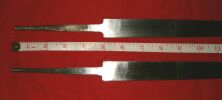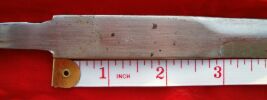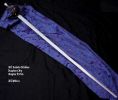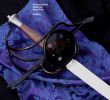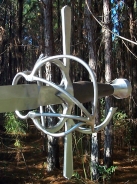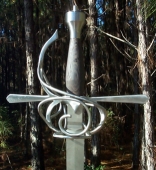Please read the
SCA
Approved Blade Types
to determine what blades you may use in your
kingdom.
Scroll down for pictures & technical details on the blades.

Rapier Blades Price Comparison
| Zen Warrior Armory |
Alchem, Inc. |
Darkwood Armory |
American Fencers Supply |
Marco Krieger Armory |
James The Just |
|||
| Rapiers |
||||||||
| Alchem flat tang
|
||||||||
| 30" to 42" |
$75 |
|||||||
| Alchem rod tang |
||||||||
| 27" to 40" |
$90 |
|||||||
| Darkwood Bated |
||||||||
| 30" - 36" |
$130 |
|||||||
| 37" - 42" | $150 | $150 | ||||||
| 43" - 45" |
$160 |
|||||||
| Darkwood Practice |
||||||||
| 37" - 42" |
$140 |
$140 |
||||||
| 43" - 45" |
$150 |
|||||||
| Hanwei Practical |
||||||||
| 37" |
? |
$60 |
$60 |
|||||
|
43" |
? |
$60 |
$60 |
|||||
| MKA |
||||||||
| 30" | $140 | |||||||
| 36" - 39" |
$155 | |||||||
|
42" - 45" |
$170 | |||||||
| Triplette | ||||||||
| 35" |
$65 |
|||||||
| 40" |
$85 |
|||||||
| Angus Trim |
||||||||
| Del Tin |
||||||||
| Popinjay |
||||||||
| Starfire |
||||||||
Prices Checked August 5, 2007

| Terminology on this
page: Material - the variety of steel used in the making of this blade. Length - The length of the blade NOT including the tang. Tang length - The length of the tang. Ricasso length - The length of the non-edged, flat profiled portion of the sword beginning from the tang. Profile taper - The width of the blade measured at the beginning of the ricasso to the width of the blade measured at the tip of the blade immediately before any rounding of the tip. Distal taper - the thickness of the blade measured at the beginning of the ricasso to the thickness of the blade measured at the tip of the blade immediately before any rounding of the tip. Flex Min/Max - The force, measured in lbs. that it takes to flex the blade when stationary. First, with the palm flat on the pommel to get the minimum flex force, secondly with the hand wrapped around the tang attempting to keep the blade from flexing. (This test is the same test used by Alchem Inc.) Balance Point - the balance point of the blade. The balance point is determined then the measurement is taken from the beginning of the ricasso to that point NOT including the tang. Weight - this should be self explanatory Facts - additional facts that do not fit into the previous items. Opinions - opinions of various people about the blade(s) in question. Please feel free to send me your own opinions and they will be added without attribution (unless requested). NOTE: all measurements, etc. are taken off of naked blades. NOTE 2: Most of these blades (if not all) are hand forged and thus no two blades will ever be identical. Every statistic printed here is from a representative blade (or two)and must therefore be taken with the proverbial grain of salt. YiS Ceallach Mac Donal in the Barony of Bryn Gwlad in the Kingdom of Ansteorra MKA Kelly Hatcher Austin, Texas ceallach at dwarf works dot com |

Triplette Rapier

Zamarano

Alchem Flat Tang Schlager/Rapier
| Material: |
1074 high carbon steel |
| Length(s): |
30" to 42" |
| Tang Length: |
up to 7 1/2" |
| Tang Type: |
Flat |
| Ricasso Length: |
|
| Profile Taper: |
1 1/4" -> 3/8" |
| Distal Taper: |
|
| Flex Min/Max: | from 10/18 to 12/25 |
| Balance Point: |
|
| Weight: |
19 ounces or 540 grams
|
| Facts: Flat tang blades require a a custom pinned pommel. Blade has a button tip. |
|

Alchem Rod Tang Schlager/Rapier

Hanwei Practical Rapiers
| Material: |
1070 steel (high carbon alloy)
|
| Length(s): |
43" / 37" |
| Tang Length: |
~5" |
| Tang Type: |
Variable width tapering to
threaded 6x1 metric for the last 1 to 2 inches |
| Ricasso Length: |
~3 1/2" |
| Profile Taper: | 43" : 1 1/4" -> 3/8" 37" : 1 1/4" -> 3/8" |
| Distal Taper: |
43" : 3/16" -> 3/32" 37" : 3/16" -> 3/32" |
| Flex Min/Max: | 43" : 9 / 18 37" : 12 / 20 |
| Balance Point: |
43" : 32.4% or 13 7/8" 37" : 31.9% or 11 3/4" |
| Weight: |
43" : 15.9 ounces or 450
grams 37" : 13.6 ounces or 386 grams |
| Facts: Blade has a button tip. The Hanwei Practical Rapier series swords and blades may also be seen as "Paul Chen", "CAS Iberia", or "C.A.S. Iberia" Practical Rapiers. This blade is the cheapest entry into the heavy fencing arena, and a complete rapier can usually be found for around < $120. |
|

Darkwood Practice
| Material: |
5160 steel (chromium-molybdenum alloy) |
| Length(s): |
45" / 42" / 39" / 37" |
| Tang Length: |
|
| Tang Type: |
|
| Ricasso Length: |
2" |
| Profile Taper: |
3/4" -> |
| Distal Taper: |
|
| Flex Min/Max: | |
| Balance Point: |
|
| Weight: |
~13.8 ounces or 390 grams
|
| Facts: |
|
| Opinions: |
|

Darkwood Bated
| Material: |
5160 steel (chromium-molybdenum alloy) |
| Length(s): |
45" / 42" / 39" / 37" |
| Tang Length: |
|
| Tang Type: |
|
| Ricasso Length: |
2" |
| Profile Taper: | 7/8" -> |
| Distal Taper: |
|
| Flex Min/Max: | |
| Balance Point: |
|
| Weight: |
440 grams (~15.5 ounces) |
| Facts: |
|
| Opinions:
|
|

Del Tin Practice, Mark I
| Material: |
6150 steel (chrome-vanadium alloy) |
| Length(s): |
~42" |
| Tang Length: |
4 1/4" - 4 1/2" |
| Tang Type: |
Variable width, tapering to
~3/4" of ~15/64 threaded rod at 6x1 metric |
| Ricasso Length: |
4" |
| Profile Taper: |
3/4" -> 9/32" |
| Distal Taper: |
3/16" -> |
| Flex Min/Max: | 6.5 / ?? |
| Balance Point: |
34.2% or 14 3/8" |
| Weight: |
12.6 ounces or 358 grams
|
| Facts: This blade is no longer manufactured. |
|

Del Tin Practice, Mark II

Del Tin Bated

Angus Trim

Steel Alloys: Steel is an alloy of iron that must contain Carbon. it is the most important hardening elementOther elements may be added for specific applications. Carbon The most important element which increases the strength of the steel, and without a high enough percentage, alloy would not harden. High Carbon Steel contains minimum of .5% carbon, higher the %, higher hardness can be achieved Designation First numbers - 10 means plain carbon steel, any other number designate alloy steel. 50xx serie is a chromium steel. SAE designation system, steels with letter designations are tool steels - W-1, O-1, D-2 Designation Last numbers of a steel specify the steel's carbon content = 1095 has 0.95% carbon. 52100 has 1.0% carbon. 5160 has 0.60% carbon. Chromium - Gives the alloy it corrosion resistance, forms chromium carbides for wear resistance, and hardenability. Stainless Steel - is a steel with at least 13% chromium. The first 11% disolves and form carbides, left over are your rust resistance. Higher the %, more free chromium, more rust resistance. All stainless steel alloys can rust, they are only rust resistant, not rust proof. As with plain high carbon steels, proper blade maintenance is needed, though not as much. Manganese - Manganese helps the grain structure, and contributes to hardenability. Also strength & wear resistance. Improves the steel (e.g., deoxidizes) during the steel's manufacturing (hot working and rolling). Present in most cutlery steels except for A-2, L-6, and CPM 420V. Molybdenum - Forms carbides, prevents brittleness & maintains the steel's strength at high temperatures. It is added to many steel alloys, to enable them to harden in the air. A-2, ATS-34) always have 1% or more molybdenum Nickel - Enhancer for strength, corrosion resistance, and toughness. Present in L-6 and AUS-6 and AUS-8. Silicon - Increases strength, and wear resistance. Like manganese, it makes the steel more sound while it's being manufactured. Tungsten - Increases wear resistance. When combined properly with chromium or molybdenum, tungsten will make the steel to be a high-speed steel. The high-speed steel M-2 has a high amount of tungsten. Vanadium - Forms finely structured carbides to enhance wear resistance and hardenability. A number of steels have vanadium, but M-2, Vascowear, and CPM T440V and 420V (in order of increasing amounts) have high amounts of vanadium. BG-42's biggest difference with ATS-34 is the addition of vanadium. This information copied from: http://ajh-knives.com/metals.html |







